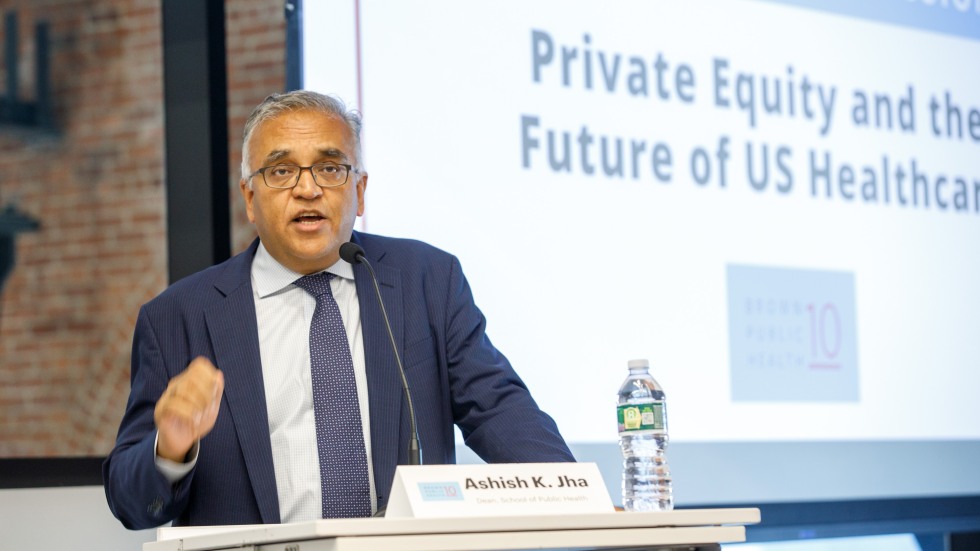Lead off discussion looks at the impact of private equity on health care
Brown University
Unchecked and ineffective health care spending is the
biggest social policy challenge facing the U.S., says Dr. Ashish K. Jha, dean
of the School of Public Health at Brown University. Not the biggest health policy
challenge, Jha stressed, but the toughest social policy
challenge — one that’s costing $4.3 trillion, close to 20% of the United
States’ gross domestic product.
Dr. Jha. Photo by Kenneth Zirkel
While there are no silver bullets, Jha says there are
definitely better, more data-driven ways to attack what he calls a “behemoth of
a problem.” And that’s the idea that underpins the new Center for Advancing Health Policy through Research at
Brown’s School of Public Health.
The dean formally launched the center in front of a
packed room of faculty and students from public health and medicine, as well as
policymakers, community leaders and legal scholars. The early-October launch
event took place at South Street Landing in Providence’s Jewelry District —
within easy walking distance from the School of Public Health, the Warren
Alpert Medical School and the city’s major hospitals.
“The Center for Advancing Health Policy through Research is predicated on the idea that if we're going to make progress that's sustainable, that's actually going to move the needle, it has to be data-driven,” Jha said. “Because if you go to Washington and you lay out this problem, you'll immediately get everybody giving you their favorite solution. And almost all those solutions are data-free.”
The center was approved by Brown’s Academic Priorities
Committee in June, and was officially up and running with the start of the
2023-24 academic year.
Brown already had top researchers in this field, Jha
said. They are now joined by Andrew Ryan, director of CAHPR (pronounced
“CAY-per”) and a professor of health services, policy and practice who has been
at the forefront of health policy research for over a decade.
“The mission of CAHPR is to generate the highest-quality
evidence to advance and form discussions around health care, affordability,
access and value in the United States, and to translate this information toward
policy change,” Ryan said.
What makes CAHPR unique, Ryan said, is a focus on
translating research into policy. Often, he noted, scholarly research remains
sequestered in peer-reviewed journals; it doesn't get to the policy makers and
community stakeholders who are trying to improve health care systems. CAHPR
scientists hope to do more than conduct great research; they also hope to
influence health policy at the national and state level.
“This is something that's important to us and something
that we're really trying to address in the center,” Ryan said. “How we're doing
this is through targeted dissemination to policy makers and engagements with
community stakeholders and policy makers.”
Upcoming CAHPR events include a panel discussion in
Washington, D.C., during which Brown researchers and national policy makers
will come together to talk about Medicare Advantage; and a seminar series
focused on health policy research. Ryan said that center priorities also
include supporting national initiatives with respect to transparency and
Medicare Advantage and private equity.
Faculty are currently mentoring a number of public health
Ph.D. students who are working as research assistants on CAHPR projects, where
they’re learning about research methods as well as how to translate findings
into policy. The center also launched a Health Data
Science Summer Fellowship Program, designed to equip students at
Brown with essential skills in data management and programming in the field of
health data science.
A realistic approach to problems caused by private equity
To illustrate CAHPR’s approach, the School of Public
Health hosted a panel discussion on the impact of private equity in health care
— what it means for patient care, costs, outcomes, access and more. In private
equity, investment firms purchase mature businesses like physician practices or
hospitals or nursing homes, seek to revamp them and then resell them in a short
period of time.
Panelists included Brown public health faculty members
Christopher Whaley, an expert on markets and regulation in health care, and
Yashaswini Singh, an expert on private equity; Erin Fuse Brown, a law professor
at Georgia State University College of Law, expert on health and administrative
law and a collaborator of CAHPR; and Cory King, acting health insurance
commissioner of Rhode Island.
The panelists not only made the topic of private equity
ownership of health care sound as riveting as a true crime novel, but they also
provided clear examples of how research could be used to influence policy
levers and solutions to identify and address some of the harms of private
equity ownership.
One question from the crowd: Where is the money going to
come from, if not private equity?
Jha and Ryan had previously acknowledged that “uprooting
private equity from the health care system” wasn’t a feasible solution. But the
answer from Fuse Brown was more nuanced.
“So it's about, ‘How do we manage the risks and the
harms?’” Fuse Brown said. “Is there a way to access the capital, but put some
guardrails around the worst harms to patient care, to physicians, and to costs
and consolidation, of course… I think that's actually something worth doing,
even if it sort of just slows down the worst effects of it.”